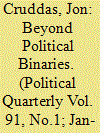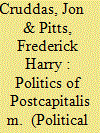|
|
|
Sort Order |
|
|
|
Items / Page
|
|
|
|
|
|
|
| Srl | Item |
| 1 |
ID:
172399


|
|
|
|
|
| Summary/Abstract |
This article considers the results of the 2019 general election with reference to the Dagenham and Rainham constituency in outer East London. It was a key target for the Conservatives with a 70 per cent leave voting electorate. It did not change hands and might therefore provide insights into the wider debate regarding future coalitions and strategy within the modern left. This article considers these results with reference to arguments about a ‘Brexit realignment’ on the left and whether Labour should rethink the nature of its political ‘base’. It argues for a more nuanced debate than that which currently exists, built around simple binaries organised around Brexit, class, age, education and geography.
|
|
|
|
|
|
|
|
|
|
|
|
|
|
|
|
| 2 |
ID:
165554


|
|
|
|
|
| Summary/Abstract |
The idea of suburbia, or the suburban, or the suburbs, can imply a number of different things. Suburbia suggests a physical place, in general the outskirts of a city or large town; suburban can infer a certain lifestyle; and the idea of the suburbs is often used to identify a community or class of people who inhabit a specific territory. In politics, these terms can also retain various meanings in terms of geography, culture or community. Alongside the ideas of the urban or the rural, they are often used to debate questions of political strategy and shifting electoral coalitions. In this article, ideas of urban and suburban places, cultures and communities are used to consider wider debate regarding future coalitions and strategy within the modern left, specifically a renewed urban politics that can be identified. This new ‘urbanism’ suggests a geographical realignment—partly on cultural or lifestyle grounds—which is significant within an overall attempt to redefine the ‘base’ of the left in terms of class and community. This article considers these issues with reference to what historically has been described as the ‘Progressive Dilemma’.
|
|
|
|
|
|
|
|
|
|
|
|
|
|
|
|
| 3 |
ID:
173993


|
|
|
|
|
| Summary/Abstract |
This article introduces the special issue on the politics of postcapitalism. Considering the theoretical foundations, empirical perspectives and political ramifications of claims made about a coming ‘post‐work’ or ‘postcapitalist’ society, it maps existing debates through a discussion of two key recent texts, Paul Mason’s Clear Bright Future and Aaron Bastani’s Fully Automated Luxury Communism. It first surveys how the relationship between labour market trends, technological change and wider political‐economic shifts is articulated in the postcapitalist literature. It then explores how concepts from Marx are deployed to depict social relations as a constraint on technological development and its utopian potentialities, leading to political demands for new class actors and electoral blocs centring on the new forms of economic and political activity associated with digital networks. It also considers the role of the state and how this theoretical and political approach envisions historical change, situating utopian visions of an incipient postcapitalist alternative to capitalism within the contemporary political context of authoritarian populism and challenges to liberal democracy. Finally, it explores the continuing relevance of humanism as a critical counterpoint to the social and philosophical agenda of present day ‘posthumanism’. It concludes that, in unfavourable political conditions, it would be strategically unwise to stake too much on an over‐optimistic approach to the unfolding future. This outlook, it is suggested, carries considerable risks and consequences for a contemporary left in search of a viable electoral coalition and route back to power.
|
|
|
|
|
|
|
|
|
|
|
|
|
|
|
|
|
|
|
|
|